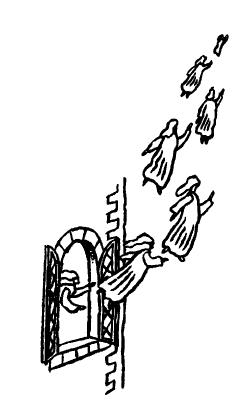Authors: Jeanette Winterson
Sexing the Cherry (6 page)

At sea, and away from home in a creaking boat, with Tradescant sleeping beside me, there is a town I sometimes dream about, whose inhabitants are so cunning that to escape the insistence of creditors they knock down their houses in a single night and rebuild them elsewhere. So the number of buildings in the city is always constant but they are never in the same place from one day to the next.
For close families, and most of the people in the city are close families, this presents no problem, and it is more usual than not for the escapees to find their pursuers waiting for them on the new site of their choice.
As a subterfuge, then, it has little to recommend it, but as a game it is a most fulfilling pastime and accounts for the extraordinary longevity of the men and women who live there. We were all nomads once, and crossed the deserts and the seas on tracks that could not be detected, but were clear to those who knew the way. Since settling down and rooting like trees, but without the ability to make use of the wind to scatter our seed, we have found only infection and discontent.
In the city the inhabitants have reconciled two discordant desires: to remain in one place and to leave it behind for ever.
On arriving there for the first time I made friends with a family, and after dinner promised to call the next day. They urged me to do so, and I did, and was upset to find that the little house had been replaced by a Museum of Antiquities. The curator was sympathetic and pointed me in the right direction. I had it in mind to go back to the museum and look at the skeleton of an extinct whale. It seemed unlikely to me that a public building would feel the same need to escape as an ordinary individual.
I was mistaken. The museum had gone back to its original site by the docks, and in its place, with room to spare, was a windmill. As I watched the blades churning the air and wondered what kind of an element air must be, to seem like nothing and yet put up such a resistance, the miller came to his round window and yelled something I couldn't hear. I caught hold of one of the blades as it passed by me and swung myself up beside him.
He asked me if I knew the story of the Twelve Dancing Princesses. I said I had heard it, and he told me they were still living just down the road, though of course they were quite a bit older now. Why didn't I go and see them?
Thinking that one dancer might well know another and that a dozen of them must surely know one I took a catch of herrings as a gift and banged on their door.
THE STORY OF THE TWELVE DANCING PRINCESSES

This page intentionally left blank

I
banged on the door and heard a voice behind me asking my name.
'My name is Jordan,' said, though not knowing to whom.
'Down here.'
There was a well by the door with a frayed rope and a rusty bucket.
'Are you looking for me?'
I explained to the head now poking over the edge of the well that I had come to pay my respects to the Twelve Dancing Princesses.
'You can start here then,' said the head. 'I am the eldest.'
Timidly, for I have a fear of confined spaces, I swung over the edge and climbed down a wooden ladder. I found myself in a circular room, well furnished, with a silver jug coming to the boil with fresh coffee.
'I've brought you some herrings,' I said, awkwardly.
At the word 'herring' there was a sound of great delight and a hand came over my shoulder and took the whole parcel.
'Please excuse her,' said the princess. 'She is a mermaid.'
Already the mermaid, who was very beautiful but without fine graces, was gobbling the fish, dropping them back into her throat the way you or I would an oyster.
'It is the penalty of love,' sighed the princess, and began at once to tell me the story of her life.

We all slept in the same room, my sisters and I, and that room was narrower than a new river and longer than the beard of the prophet.
So you see exactly the kind of quarters we had.
We slept in white beds with white sheets and the moon shone through the window and made white shadows on the floor.
From this room, every night, we flew to a silver city where no one ate or drank. The occupation of the people was to dance. We wore out our dresses and slippers dancing, but because we were always sound asleep when our father came to wake us in the morning it was impossible to fathom where we had been or how.
You know that eventually a clever prince caught us flying through the window. We had given him a sleeping draught but he only pretended to drink it. He had eleven brothers and we were all given in marriage, one to each brother, and as it says lived happily ever after. We did, but not with our husbands.
I have always enjoyed swimming, and it was in deep waters one day that I came to a coral cave and saw a mermaid combing her hair. I fell in love with her at once, and after a few months of illicit meetings, my husband complaining all the time that I stank of fish, I ran away and began housekeeping with her in perfect salty bliss.
For some years I did not hear from my sisters, and then, by a strange eventuality, I discovered that we had all, in one way or another, parted from the glorious princes and were living scattered, according to our tastes.
We bought this house and we share it. You will find my sisters as you walk about. As you can see, I live in the well.

'That's my last husband painted on the wall,' said the second princess, 'looking as though he were alive.'
She took me through her glass house showing me curiosities: the still-born foetus of the infamous Pope Joan who had so successfully posed as a Man of God until giving birth in the Easter parade. She had the tablets of stone on which Moses had received the Ten Commandments. The writing was blurred but it was easy to make out the gouged lines of the finger of God.
'I collect religious items.'
She had not minded her husband much more than any wife does until he had tried to stop her hobby.
'He built a bonfire and burned the body of a saint. The saint was very old and wrapped in cloth. I liked him about the house; he added something.'
After that she had wrapped her own husband in cloth and gone on wrapping the stale bandages round and round until she reached his nose. She had a moment's regret, and continued.

'He walked in beautym,' she said.
'His eyes were brown marshes, his lashes were like
y
willow trees. His eyebrows shot together made a between his forehead and his face. His cheeks were steep and sheer, his mouth was a volcano. His breath was like a dragon's and his heart was torn from a bull. The sinews in his neck were white columns leading to the bolts of his collar-bone. I can still trace the cavity of his throat. His chest was a strongbox, his ribs were made of brass, they shone through his skin when the sun was out. His shoulder-blades were mountain ranges, his spine a cobbled road. His belly was filled with jewels and his cock woke at dawn. Fields of wheat still remind me of his hair, and when I see a hand whose fingers are longer than its palm I think it might be him come to touch me again.
'But he never touched me. It was a boy he loved. I pierced them with a single arrow where they lay.
'I still think it was poetic.'

My husband married me so that his liaisons with other "omen, being forbidden, would be more exciting. Danger as an aphrodisiac to him: he wanted nothing easy or gentle. His way was to cause whirlwinds. I was warned, we always are, by well-wishers or malcontents, but I chose to take no interest in gossip. My husband was handsome and clever. What did it matter if he needed a certain kind of outlet, so long as he loved me? I wanted to love him; I was determined to be happy with him. I had not been happy before.
At first I hardly minded his weeks away. I did not realize that part of his sport was to make me mad. Only then, when he had hurt me, could he fully enjoy the other beds he visited.
I soon discovered that the women he preferred were the inmates of a lunatic asylum. With them he arranged mock marriages in deserted barns. They wore a shroud as their wedding dress and carried a bunch of carrots as a bouquet. He had them straight after on a pig-trough altar. Most were virgins. He liked to come home to me smelling of their blood.
Does the body hate itself so much that it seeks release at any cost?
I didn't kill him. I left him to walk the battlements of his mined kingdom; his body was raddled with disease. The same winter he was found dead in the snow.
Why could he not turn his life towards me, as trees though troubled by the wind yet continue in the path of the sun?

You may have heard of Rapunzel.
Against the wishes of her family, who can best be described by their passion for collecting miniature dolls, she went to live in a tower with an older woman.
Her family were so incensed by her refusal to marry the prince next door that they vilified the couple, calling one a witch and the other a little girl. Not content with names, they ceaselessly tried to break into the tower, so much so that the happy pah-had to seal up any entrance that was not on a level with the sky. The lover got in by climbing up RapunzeFs hair, and Rapunzel got in by nailing a wig to the floor and shinning up the tresses flung out of the window. Both of them could have used a ladder, but they were in love.
One day the prince, who had always liked to borrow his mother's frocks, dressed up as Rapunzel's lover and dragged himself into the tower. Once inside he tied her up and waited for the wicked witch to arrive. The moment she leaped through the window, bringing their dinner for the evening, the prince hit her over the head and threw her out again. Then he carried Rapunzel down the rope he had brought with him and forced her to watch while he blinded her broken lover in a field of thorns.